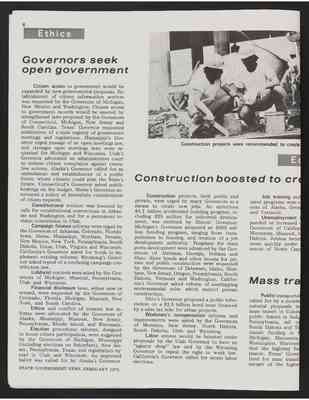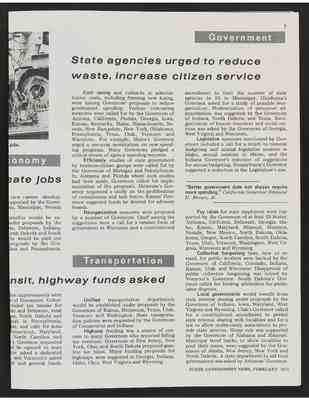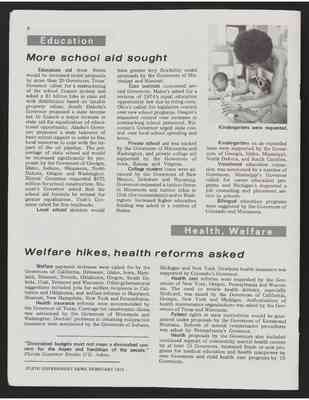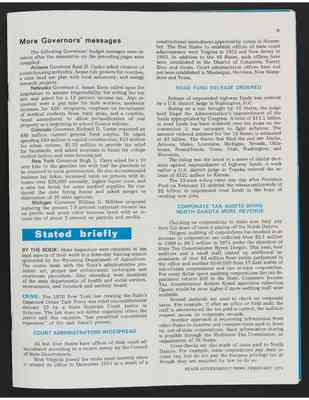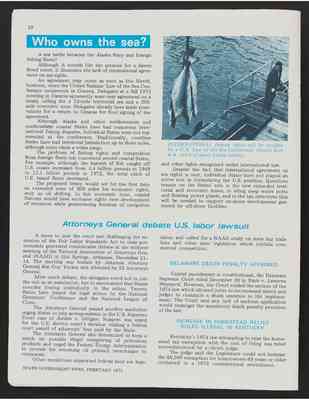Pages
21
6 Ethics Governor seek open government
Citizen access to government would be expanded by new gubernatorial proposals. Establishment of citizen information services was requested by the Governors of Michigan, New Mexico and Washington. Citizen access to government records would be accused by strengthened laws proposed by the Governors of Connecticut, Michigan, New Jersey and South Carolina. Texas' Governor requested publication of a state registry of government meetinGs and regulations. Mississippi's Governor urged passage of an open meetings law, and stronger open meetings law were requested for Michigan and Wisconsin. Utah's Governor advocated an administrative court to redress citizens againstst executive actions. Alaska's Governor called for an ombudsman and establishment of a public forum where citizens could plan public hearings on the budget. Maine's Governor announced a policy of immediate consideration of citizen requests.
Constitutioanl revision was boosted by calls for constitutional conventions in Arkansas and Washington and for a permanent revision commission in Utah.
Campaign finance reforms were urged by the Governors of Arkansas, Colorado, Florida, Iowa, Maine, Mississippi, Montana, Nevada, New Mexico, New York, Pennsyvania, South Dakota, Texas, Utah, Virginia and Wisconsin. California's Governor asked for funds to implement existing reforms. Wyoming's Governor asked repeat of a confusing campaign contribution law.
Lobbyist controls were asked by the Governors of Michigan, Missouri, Pennsylvania, Utah and Wisconsin.
Financial disclosure laws, either new or revised, were requested by the Governors of Colorado, Florida, Michigan, Missouri, New York, and South Carolina.
Ethics and conflict of interest law reforms were advocated by the Governors of Alaska, Missippi, Missouri, New Jersey, Pennsylvania, Rhode Island, and Wisconsin.
Election procedures reforms, designed to boost citizen participation, were suggested by the Governors of Michigan, Mississippi (including elections on Saturdays). New Jersey, Pennsylvania, Texas, registration by mail in Utah and Wisconsin . An improved ballot was called for by Alaska's Governor.
[second column] [picture of two construction workers with the following text Construction projects were recommended to create
Construction booted to create jobs Construction projects, both public and private, were urged by many Governors as a means to create new jobs. An ambitious $4.1 billion accelerated building program, including $25 million for industrial development, was outline by Illinois' Governor Michigan's Governor proposed an $805 million bonding program, ranging from transportation to housing, and creation of a job development authority. Programs for state ports development were advanced by the Governors of Alabama, Georgia, Indiana and Ohio. State bonds and other boosts for private and public construction were requested by the Governors of Delaware, Idaho, Montana, New Jersey, Oregon, Pennsylvaniz, South Dakota, Vermont and Washington. California's Governor asked reform of overlapping environmental rules which restrict private contruction.
Ohio's Governor proposed a public referendum on a $2.5 billion bond issue financed by a sales tax hike for urban projects.
Workmen's compensation reforms and improvements were asked by the Governors of Montana, New Jersey, North Dakota, South Dakota, Utah and Wyoming.
Labor unions would be boosted under proposals by the Utah Governor to have an "agency shop" law and by the Wyoming Governor to repeal the right to work law. California;s Governor called for secret labor elections.
Economy
Construction boosted to create jobs
Job training and new careers, development programs were supported by the Governor of Alaska, Georgia , Mississippis, Nevada.
Unemployment benefits would be expanded or increased under proposals by the Governors of Califorina, Delaware, Indiana, Minnesota, Missouri, North Dakota and South Dakota. Jobless benefit would be paid out more quickly under proposals by the Governors of North Carolina.
Mass transit highway funds asked Public transporation improvements were called for by a number of Governors. Gubernatiorial proposals included tax breaks for Colorado and Delaware, rural public transist in Indiana, North Dakota and Pennsylvania, rail transit in Pennsylvania, South Dakota and Texas and calls for mass transit funding in Connecticut, Maryland, Michigan, Minnesota, North Carolina and Washington, Wisconsin's Governor requested that the highway fund be opened to mass transit. Texas' Governor asked a dedicated for mass transit fund for mass merger of the highway and general funds
STATE GOVERNMENT NEWS, FEBRUARY 1975
22
Government State agencies urged to reduce waste, increase citizen service [column one] Cost saving and cutbacks in administrative costs, including freezing new hiring, were among Governors' proposals to reduce government spending. Various cost-saving measures were called for by the Governors of Arizona, California, Florida, Georgia, Iowa, Kansas, Kentucky, Maine, Massachusetts, Nevada, New Hampshire, New York, Oklahoma, Pennsylvania, Texas, Utah, Vermont, and Wisconsin. For example, Maine's Governor urged a one-year moratorium on new spending programs. Many Governors pledged a critical review of agency spending requests.
Efficiency studies of state government by business-citizen groups were called for by the Governors of Michigan and Pennsylvania. In Alabama and Florida where such studies had been made, Governors called for implementation of the proposals. Delaware's Governor requested a study on the proliferation of commissions and task forces. Kansas' Governor suggested funds be deleted for advisory boards.
Reorganization measures were proposed by a number of Governors. Chief among the suggestions were a call for a cabinet form of government in Wisconsin and a constitutional
Transportation Unified transportation departments would be established under proposals by the Governors of Kansas, Minnesota, Texas, Utah, Vermont and Washington, State transportation policies were requested by the Governors of Connecticut and Indiana.
Highway funding was a source of concern to many Governors who reported falling tax revenues. Governors of New Jersey, New York, Ohio and South Dakota proposed gasoline tax hikes. Major funding proposals for highways were suggested in Georgia, Indiana, Idaho, Ohio, West Virginia and Wyoming.
[column two] amendment to limit the number of state agencies to 50 in Mississippi. Oklahoma's Governor asked for a study of possible reorganizaton. Modernization of personnel administration was suggested by the Governors of Indiana, North Dakota, and Texas. Reorganization of human resources and social services was asked by the Governors of Georgia, West Virginia and Wisconsin.
Legislative measures mentioned by Governors included a call for a return to biennial budgeting and annual legislative sessions in Idaho, annual sessions in Maine, and the Indiana Governor's rejection of suggestions for annual budgeting Pennsylvania's Governor suggested a reduction in the Legslature's size.
"Better government does not alway require more spending," California Governor Edmund G. Brown, Jr.
Pay raises for state employees were supported by the Governors of at least 23 States: Alabama, California, Delaware, Georgia, Idaho, Kansas, Maryland, Missouri, Montana, Nevada, New Mexico, North Dakota, Oklahoma, Oregon, South Carolina, South Dakota, Texas, Utah, Vermont, Washington, West Virginia, Wisconsin and Wyoming.
Collective bargaining laws, new or revised, for public workers were backed by the Governors of California, Colorado, Indiana, Kansas, Utah and Wisconsin, Disapproval of public collective bargaining was voiced by Vermont's Governor. South Dakota's Governor called for binding arbitration for public labor disputes.
Local governments would benefit from state revenue sharing under proposals by the Governors of Indiana, Iowa, Maryland, West Virginia and Wyoming. Utah's Governor called for a constitutional amendment to permit state revenue sharing with localities and for a law to allow multicounty associations to provide state services. Home rule was supported by the Governors of Alabama and Missouri. Municipal bond banks, to allow localities to pool their issues, were suggested by the Governors of Alaska, New Jersey, New York and North Dakota. A state department to aid local governments was asked by Arkansas' Governor.
STATE GOVERNMENT NEWS, FEBRUARY 1975
23
8 Education More school aid sought [three columns] [first column] Education aid from States would be increased under proposals by more than 20 Governors. Texas' Governor called for a restructuring of the school finance system and asked a $1 billion hike in state aid with distribution based on taxable property values. South Dakota's Governor proposed a state income tax to finance a major increase in state aid for equalization of educational opportunity. Alaska's Governor proposed a state takeover of basic school support in order to free local resources to cope with the impact of the oil pipeline. The percentage of state school aid would be increased significantly by proposals by the Governors of Georgis, Idaho, Indiana, Minnesota, North Dakota, Oregon and Washington. Illinois' Governor requested $375 million for school constructon. Missouri's Governor asked that the school aid formula be revised for greater equalization. Utah's governor called for free textbooks.
Local school disctricts would
[second column] have greater levy flexibility under proposals by the Governors of Mississippi and Missouri.
Cost controls concerned serveral Governors. Maine's asked for a revison of 1974's equal education opportunity law due to rising costs. Ohio's called for legislative control over new school programs. Oregon's requested control over increases in nonteaching school personnel. Wisconsin's Governor urged state control over local school spending and levies.
Private school aid was backed by the Governors of Minnesota and Washington, and private college aid supported by the Governors of Iowa, Kansas and Virginia.
College studdent loans were advanced by the Governors of New Mexico, Delaware and Wyoming. Governors requested a tuition freeze in Minnesota and tuition hikes in Utah (for nonresidents) and in Washington. Increased higher education funding was asked in a number of States.
[third column] [picture of a teacher helping a student with another sitting next to her, with the text as follow Kindergartens were requested.] Kindergarten on an expanded basis were supported by the Governors of Georgia, Idaho, Mississippi, North Dakota, and South Carolina.
Vocational education expansion was mentioned by a number of Governors. Mississippi's Governor called for career education programs and Michigan's requested a job counseling and placement service in schools.
Bilingual education programs were suggested by the Governors of Colorado and Minnesota.
Health, Welfare Welfare hikes, health reforms asked [two columns] [first column] Welfate payment increases were called for by the Governors of California, Delaware, Idaho, Iowa, Maryland, Missouri, Nevada, Oklahoma, Oregon, South Dakota, Utah, Vermont and Wisconsin. Other gubernatorial suggestions included jobs for welfare recipients in California and Oklahoma, and welfare reforms in Maryland, Missouri, New Hampshire, New York and Pennsylvania.
Health insurance reforms were recommended by the Governor of Texas. Coverage for catastrophic illness was advocated by the Governors of Minnesota and Washington. Doctors' problems in obtaining malpractice insurance were mentioned by the Governors of Indiana,
[second column] Michigan and New York. Newborn health insurance was supported by Colorado's Governor.
Health cost reforms were requested by the Governors of New York, Oregon, Pennsylvania and Wisconsin. The need to review health delivery, especially Medicaid, was raised by the Governors of California, Georgia, New York and Michigan. Authorization of health maintenance organizations was asked by the Governors of Texas and Wisconsin.
Patient rights at state institutions would be guaranteed under proposals by the Governors of Kansas and Montana. Reform of mental commitment procedures was asked by Pennsylvania's Governor.
Health proposals by the Governors also included contined support of community mental health centers by at least 15 Governors increased funds or new programs for medical education and health manpower by nine Governors and child health care programs by 10 Governors.
"Diminished budgets must not mean a diminished concern for the hopes and harships of the people." Florida Governor Reubin O'D. Askew.
STATE GOVERNMENT NEWS, FEBRUARY 1975
24
9 More Governors' messages [two columns] The followng Governors' budget messages were received after the summaries on the preceding pages were complies.
Arizona Governor Raul H. Castro asked creation of a state housing authority, home rule powers for counties, a state land use plan with local autonomy, and enery research projects.
Nebraska Governot J. James Exon called upon the Legislature to assume responsibility for setting the tax rate and asked for a 13 percent income tax. Also requested were a pay raise for state workers, moderate increases for ADC recipients, emphasis on recruitment of medical students from rural areas, and a constitutional amendment to allow reclassificaton of real property as a beginning to school finance reform.
Colorado Governor Richard D. Lamm reported an $86 million current general fund surplus. He urged spending $40 million in capital construction, $10 million for urban centers, $1.25 million to provide tax relief for farmlands, and asked increases in funds for college students tuition and state housing aid.
New York Governor Hugh L. Carey asked for a 10 cent hike in the gasoline tax with half the proceeds to be returned to local governments. He also recommended business tax hikes, increased taxes on persons with incomes over $25,000 annually, higher liquor taxes, and a sales tax break for some medical supplies. He continued the state hiring freeze and asked merger or elimination of 30 state agencies.
Michigan Governor William G. Milliken proposed replacing the present 7.8 percent corporate income tax on profits and seven other business taxes with an income tax of about 2 percent on payrolls and profits.
Stated briefly By The Book: State inspectors were educated in the legal aspects of their work in a three-day training session sponsored by the Wyoming Department of Agriculture. The course dealt with the State's administrative procedure act, proper law enforcement techniques and courtroom procedure. Also attending were memebers of the state departments of health and social services, environment, and livestock and sanitary board.
Crime: The 1970 New York law creating the State's Organized Crime Task Force was ruled unconstitutioanl January 23 by a State Supreme Court justice in Suracus. The law does not define organized crime; the justice said this omission "has permitted unrestricted expansion" of the task force's powers.
COURT ADMINISTRATORS WIDESPREAD All but four States have offices of state court administrator according to a recent survey by the Council of State Governments.
West Virginia joined the ranks most recently when it created its office in December 1974 as a result of a
[second column] constitutional amendment approved by voters in November. The first States to establish offices of state court administrator were Virgina in 1952 and New Jersey in 1953. In addition to the 46 States, surch offices have been established in District of Columbia, Puerto Rico and Guam. Court administrator offices have not yet been established in Mississippi, Montana, New Hampshire and Texas.
ROAD FUND RELEASE ORDERED Release of impounded highway funds was ordered by a U.S. district judge in Washington D.C.
Ruling on a suit brought by 12 States, the judge held illegal the Administration's impoundment of the funds appropriated by Congress. A total of $11.1 billion in road funds has been withheld over the years on the contention it was necessary to fight inflation. The amount ordered released for the 12 States is estimated at $2 billion. The States that filed the suit are Alaska, Arizona, Idaho, Louisiana, Michigan, Nevada, Oklahoma, Pennsylvania, Texas, Utah, Washington, and Wisconsin.
The ruling was the latest in a series of similar decisions against impoundment of highway funds. A week earlier a U.S. district judge in Topeka ordered the release of $121 million to Kansas.
The 12-state ruling came one day after President Ford on February ordered the release nationwide of $2 billion in impounded road funds in the hope of creating new jobs.
CORPORATE TAX AUDITS BRING NORTH DAKOTA MORE REVENUE
Checking on corporations to make sure they pay their full share of taxes is paying off for North Dakota.
Diligent auditing of corporations has resulted in an increase in corporation tax collected from $2.1 million in 1969 to $6.7 million in 1974 under the direction of State Tax Commissioner Byron Dorgan. This year, four auditors and a small staff turned up additional assessments of over $2 miilion from audits performed in the office and another $540,000 from 17 field audits of out-of-state corporations and one in-state corporation. For every dollar spent auditing corporations the tax deparment returns $30 to the State. Corporate Income Tax Administrator Robert Kessel maintains collection figures would be even higher if more auditing staff were available.
Several methods are used to check on corporate taxes. For example, if after an office or field audit the staff is unconvinced the tax paid is correct, the auditors request access to corporate records.
Another approach is requesting information from other States to examine and compare taxes paid to them by out-of-state corporations. Such information sharing is possible through the Multistate Tax Commission, an organization of 38 States.
Cross-checks are also made of taxes paid in North Dakota. For example, some corporations pay state income tax, but do not pay the business privilege tax although they are required by law to do so.
STATE GOVERNMENT NEWS, FEBRUARY 1975
25
10 [two columns] [first column] Who owns the sea? A sea battle between the Alaska Navy and foreign fishing fleets?
Although it sounds like the premise for a James Bond novel, it illustrates the lack of international agreement on sea rights.
An agreement may come as soon as this March, however, when the United Nations' Law of the Sea Conference reconvenes in Geneva. Delegates at a fall 1974 meeting in Caracas apparently were near agreement on a treaty calling for a 12-mile territorial sea and a 300-mile economic zone. Delegate already have made reservations for a return to Caracas for final signing of the agreement.
Although Alaska and other northwestern and northeastern coastal States have had numerous international fishing disputes, individual States were not represented at the conference. Tradidtionally, coastline States have had territorial jurisdiction up to three miles, although some claim a wider range.
The problem of fishing rights and competition from foreigh fleets has concerned several coastal States. For example, although the harvest of fish caught off U.S. coasts increased from 4.4 billion pounds in 1948 to 11.1 billion pounds in 1072, the total catch of U.S. based fleets decreased.
The proposed treaty would set for the first time an extended zone of 200 miles for economic rights, such as oil drilling. In this economic zone, coastal Nations would have exclusive rights over development of resources while guaranteeing freedom of navigation
[second column] [picture of a fishing boat with the following text INTERNATIONAL fishing rights will be decided by a U.N. Law of the Sea Conference. Shown here is a carch of giant Alaska halibut.]
and other rights recognized under international law.
Despite the fact that international agreement on sea rights is near, individaul States have not played an active role in formulating the U.S. position. Questions remain on the States' role in the new extended territorial and economic zones, in siting deep water ports and floating power plants, and in the tax structures that will be needed to support on-shore development generated by off-shore facilities.
Artorneys General debate U.S. labor lawsuit
[two columns] [first column] A move to join the court suit challenging the extension of the Fair Labor Standards Act to state governments generated considerable debate at the midyear meeting of the National Association of Attorneys General (NAAG) in Hot Springs, Arkansas, December 11-14. The meeting was hosted by Arkansas Attorney General Jim Guy Tucker and attended by 32 Attorneys General.
After much debate the delegates voted not to join the suit as an association, but to recommend that States consider joining the legal action by the National Governors' Confernce and National League of Cities.
The Attorneys General passed another reolution urging States to join as respondents in the U.S. Supreme Court case of Jordan v. Gilligan/ Support was urged for the U.S. district court's decision voiding a federal court award of attorneys' fees paid by the State.
The Attorneys General also determined to keep a watch on possible illegal overpricing of petroleum products and urged the Federal Energy Administration to provide for returning oil product overcharges to consumers.
Other resolutions supported federal land use legislation
[second column] and called for a NAAG study on state fair trade laws and other state legislation which inhibits commercial competition.
DELAWARE DEATH PENALTY AFFIRMED
Capital punishment is constitutional, the Delaware Supreme Court ruled December 30 in State v. Lenorna Sheppard. However, the Court voided the section of the 1974 law which allowed juries to recommend mercy and judges to commute a death sentence to life imprisonment. The Court said any lack of unifome application would endanger the mandatory death penalty provision of the law.
INCREASE IN HOMESTEAD RELIEF RULED ILLEGAL IN KENTUCKY
Kentucky's 1974 law attempting to raise the homestead tax exemption with the cost of living was ruled unconstitutional by a circuit judge.
The judge said the Legislature could not increase the $6,500 exemption for homeowners 65 years or older contained in a 1973 constitutional amendment.
STATE GOVERNMENT NEWS, FEBRUARY 1975
